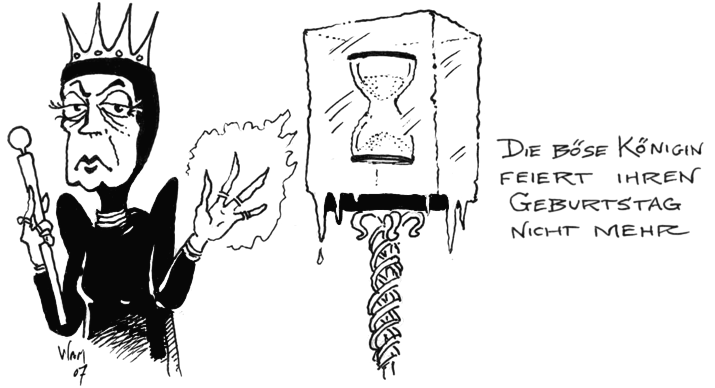Die Monate und Jahreszeiten – Months and Seasons
Die Monate
Following are the twelve months in the calendar year (im Jahr):
| der Januar | der März | der Mai | der Juli | der September | der November |
| der Februar | der April | der Juni | der August | der Oktober | der Dezember |
To express that something takes place in a particular month, put the preposition im before the name of the month:
| Maria hat im Januar Geburtstag. | Maria’s birthday is in January. |
| Die Zwilling haben im Oktober Geburtstag. | The twins have birthdays in October. |
| Die böse Königin feiert ihren Geburtstag nicht, weil sie alt ist. Sie ist sehr eitel. | The evil queen doesn’t celebrate her birthday because she is old. She is very vain. |
Dates and festivals – die Feiertage
| Im Februar feiert man Karneval, besonders in Köln und Düsseldorf; in Mainz nennt man den Karneval Fasching! |
| Im März oder im April feiert man Ostern. |
| Am ersten Sonntag im Mai feiert man Muttertag und am 1. Mai den Tag der Arbeit. |
| Ende Juni gibt es Examen an der Uni und das Wintersemester ist vorbei. |
| Am 4. Juli feiert man in Amerika den Unabhängigkeitstag. |
| Ende September gibt es das große Oktoberfest in München. |
| Am 3. Oktober feiert man in Deutschland den Tag der deutschen Einheit. |
| Im November ist die Berliner Mauer gefallen. |
| Im Dezember gibt es überall Weihnachtsmärkte. |
| Am 6. Dezember feiert man den Nikolaustag, Weihnachten am 24., 25. und 26. und Silvester am 31. Dezember. |






The preposition ‘am’
To say when in a month something happens, you will need to use the ordinal numbers (first, second, third, etc.) and the preposition am. (Please note that in writing, you put a period after the number to indicate the date.)
| Maria hat am 1. (am ersten) Januar Geburtstag. | Maria’s birthday is on the first of January. |
| Michael hat am 14. Februar (am vierzehnten) Geburtstag. | Michael’s birthday is on the 14th of February. |
Here is the contrast between “it is the …” and “on the …”:
| Es ist der … (it is) | Am … (on the) |
| der erste Januar (the first of January) | am ersten Januar (on the first of January) |
| der zweite Februar (the second of February) | am zweiten Februar (on the second of February) |
| der dritte März (the third of March) | am dritten März (on the third of March) |
| der vierte April (the fourth of April) | am vierten April (on the fourth of April) |
| der fünfte Mai (the fifth of May) | am fünften Mai (on the fifth of May) |
| der sechste Juni (the sixth of June) | am sechsten Juni (on the sixth of June) |
| der achtzehnte Juli (the 18th of Junly) | am achtzehnten Juli (on the 18th of July) |
| der zwanzigste August (the 20th of August) | am zwanzigsten August (on the 20th of August) |
| der elfte September (the 11th of September) | am elften September (on the 11th of September) |
| der zweiundzwanzigste Oktober (the 22nd of October) | am zweiundzwanzigsten Oktober (on the 22nd of October) |
| der dreißigste November (the 30th of November) | am dreißigsten November (on the 30th of November) |
| der einundreißigste Dezember (the 31st of December) | am einunddreißigsten Dezember (on the 31st of December) |
Die Jahreszeiten
| der Winter | das Frühjahr/
der Frühling |
der Sommer | der Herbst |
| Dezember | März | Juni | September |
| Januar | April | Juli | Oktober |
| Februar | Mai | August | November |




To express that something happens during a particular season, you need to use the preposition im:
| Wir fahren im Winter gerne Ski. | In the winter we like to go skiing. |
| Im Frühjahr pflückt Maria Blumen. | In the spring Maria picks flowers. |
| Im Sommer reisen wir an die Ostsee. | During the summer we travel to the Baltic Sea. |
| Im Herbst sammeln wir Pilze. | In the fall we collect mushrooms. |





